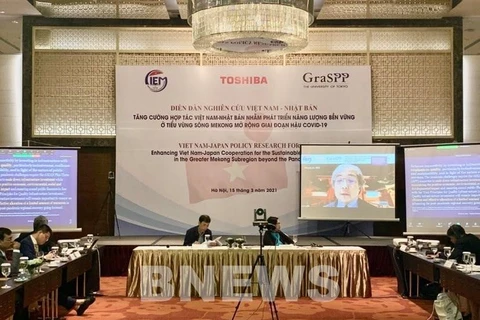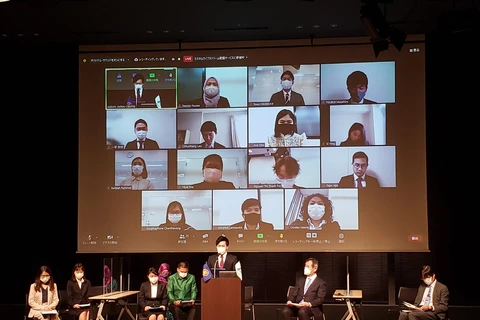Da Nang (VNS/VNA) - Many Japanese businesses investing in Vietnam have been seeking cooperation in joint-surveys, research and human resources exchange with local universities as a crucial step to expand in Vietnam beyond Ho Chi Minh City and Hanoi.
A survey on potential cooperation between 24 universities of Vietnam and Japanese businesses in Vietnam was recently organised by the Japan External Trade Organisation (JETRO).
JETRO said 24 percent of Japanese enterprises said they expect to host Vietnamese students at their factories, while 33 percent raised concerns about employing Vietnamese university graduates.
Twenty-two percent of Japanese enterprises wanted more exchanges with areas in Vietnam outside of Hanoi and HCM City in Vietnam, according to JETRO.
JETRO said 80 percent of cooperation and joint-venture projects among Japanese firms and universities and colleges in human resources and research still remained concentration in Hanoi and HCM City.
Director of JETRO Hanoi Office Nakajima Takeo said Japanese investors have been seeking new destinations in Vietnam in recent years, but human resources, research, technological capabilities and science knowledge at local universities are limited.
He said JETRO’s survey aimed to show the true potential in cooperation and shared research and studies among Japanese businesses and local universities.
“Although remaining a bit different, training programmes at universities in Vietnam are quite similar to Japan. However, Vietnamese universities in Hanoi and HCM City have built up better links with Japanese businesses rather than in other provinces and cities,” Takeo said.
“Some colleges in big cities such as Hanoi, HCM City and Hue have developed research and infrastructure, but not yet in other places. English is the most popular foreign language at Vietnamese universities, while Japanese and Korean followed,” he said.
He added Japanese businesses and Vietnamese colleges had built links through scholarships, joint-research programmes and employment.
He hoped the cooperation between Japanese enterprises and Vietnamese colleges would promote human resources supplies for the two countries.
Japanese Deputy Ambassador to Vietnam Asazuma Shinichi said the relationship between Japan and Vietnam has drastically developed in different fields.
He said last year’s visit to Vietnam by Japanese Prime Minister Yoshihide Suga confirmed the good bilateral relationship between Japan and Vietnam.
“The webinar (held on March 5 to report the JETRO survey results) promised to raise concerns in cooperation between the Vietnamese education system and Japanese enterprises. Among positive cooperation ties with localities, businesses and universities, Dong A College in Da Nang has promoted efforts in meeting the human resource demands at the two countries,” Shinichi said.
He hoped the Japan-Vietnam relationship would be strongly prompted as 2023 will mark the 50th anniversary of diplomatic ties between Vietnam and Japan.
Joint support
Yamamura Tomokazu, head of project development in Vietnam under the Aijinkai Healthcare Group, said the group developed two nursing training projects in Thailand and Vietnam, and a skills lab at the Da Nang-based Dong A University.
“We developed 70 healthcare centres, hospitals and a nursing home for the elderly with total of 2,600 beds. Our group sent experts and trainers to help train Vietnamese at nursing centres and colleges,” Tomokazu said.
“Aijinkai Group and Dong A have joined hands to boost practical and training for Vietnamese nursing students at the skills lab – which offers Japanese standard nursing conditions for Vietnamese senior students – under the training programmes by Japanese experts to provide skills and knowledge for Vietnamese students before working in Japan,” he said.
He said Vietnamese students will join practical internship courses at hospitals in Japan before returning to work at high-quality hospitals in Vietnam.
“Vietnamese students who learned experience from senior Japanese nurses at hospitals in Japan will help other Vietnamese nurses in Vietnam deal with human resource deficiencies in both countries,” he added.
According to JETRO, the cooperation between Dong A University and Aijinkai Group is a positive and effective example of cooperation between Japanese and Vietnamese partners.
Chairman of Dong A University Council, Luong Minh Sam said the Da Nang-based university has been building long-term cooperation in education and human resources training with 72 Japanese partners and seven cities in Japan over the past 10 years.
He said more than 300 students from the university have qualified for internships and high-quality human resources programmes in Japan.
“Despite the hit of COVID-19, we still sent 25 qualified students to study and practice in Japan. A group of 500 students in automobile, hospitality, economics, food industry and construction are planned to work in Japan in 2021-22,” Sam said.
He added the university offers Japanese language education to more than 2,000 students, and it plans to select 2,500 qualified students to work and practice at hospitals in Japan under cooperation deals with Aijinkai Group and other partners each year.
He also said Dong A had inked education and technology transfer contracts with universities in Japan such as Shibaura Institute of Technology, the University of Tokyo, Nagasaki University, Advanced Institute of Industrial Technology and the Japan Foundation.
Yamamura Tomokazu also shared that Japanese senior nurses will help Vietnamese students to overcome initial difficulties and difference in culture and working skills while in Japan.
He said the group would support Vietnamese students with an internship visa for a less than one-year working scheme in Japan as well as accommodation and traffic.
To help Vietnamese students study in Japan, Hạ Long University in the eponymous northern province asked Japanese businesses to grant scholarships, recruitment and workshops on Japanese language and start-ups.
The university launched its Japanese language faculty in 2016 and implemented a joint-research at the UNESCO-recognised world heritage Hạ Long Bay and other environmental science activities with Shiga Prefecture in 2018.
Hai Phong Maritime College could not establish a Japanese language department as it has only one Japanese teacher and six Vietnamese lecturers in the Japanese language.
JETRO also said Nam Dinh nursing college – where provided graduated students for training in Japan and Germany – called Japanese businesses funding vocational training equipment, Japanese language for students from the first year.
Vietnamese young students prefer working in Japan in terms of better payment, similar culture, professional working environment and friendly relationship between Japan and Vietnam, according to Sam.
Dong A college is the only education centre in central Vietnam providing human resources for the Japanese labour market./.
VNA























